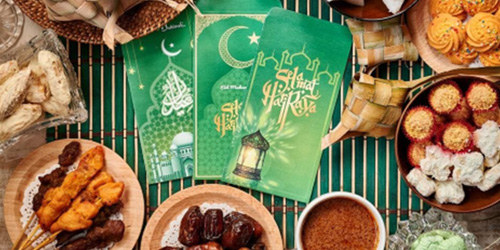Celebrating Eid ul-Adha at the Chaplaincy

Join the Chaplaincy for a celebration of Eid ul-Adha, one of the most important occasions in the Muslim calendar, commemorating the sacrifice of Prophet Ibrahim, and marking the of end of Hajj.
- Date: Monday 24 June
- Time: 11am-1pm
- Venue: Students' Union, Ambika Paul Building, City Campus
- Register: Please complete this form to register to attend the event.
For enquiries, contact the Chaplaincy at chaplaincy@wlv.ac.uk.
A message from Imam Mohammad Asad MBE, Muslim Chaplain
"Eid ul Adha will be celebrated by Muslims on the 16th or 17th of June 2024. It is also known as the 'Celebration of the Offering’ and is one of the most important occasions in the Muslim calendar. It is celebrated on the tenth day of Dhul-Hijjah (the month of pilgrimage), in the twelfth and final month of the lunar based Islamic calendar.
"It marks the spiritual journey of Hajj (the Fifth Pillar of Islam), including the determination of Prophet Ibrahim (Abraham) who was prepared to sacrifice his own son Prophet Ismail (Ishmael), when commanded to do so by Allah (God).
"Although Satan tried to distract him from the task, Prophet Ibrahim drove the devil away by throwing stones - an act that has been preserved as a ritual during the Hajj. God then saw the strength of Prophet Ibrahim's devotion and gave him a ram to slaughter instead.
"This has been preserved as the idea of a person showing their piety and obedience to God by being willing to sacrifice what they love most. These days, families carry out or pay for the slaughter of an animal and share the meat three ways - among family; relatives and friends; and the poor and needy.
"Eid ul Adha falls on the third day of the Hajj, the annual pilgrimage to Makkah in Saudi Arabia, that must be undertaken by all healthy adult Muslims at least once in their life. Hajj begins on the 8th day of Dhul Hijjah and is performed over five days, or sometimes six.
"Those remaining at home will adhere to spiritual reflection, prayer, fasting, charitable acts and sharing food. From the beginning of Dhul-Hijjah until the ninth day of the month, Muslims may choose to fast. On the tenth day, Eid ul Adha begins and friends and family will gather for a feast and enjoy a few days of celebration.
"Muslims celebrate by going to the Mosque or congregating in open areas for early morning prayers. Prior to the Eid prayer, Muslims are encouraged to give to charity for those in need. Then it is time for family and friends to celebrate; by dressing up in smart clothes, enjoying delicious food and exchanging presents such as money, which is given to children, immediate relatives and loved ones.
"Eid is a joyous occasion where friends and family get together to celebrate, including having a big feast. It is also a time for increased compassion and giving to those in need.
"I would like to take this opportunity to wish all who are celebrating Eid, a very happy Eid Mubarak. May the blessings of Eid fill your hearts and homes with endless joy and happiness Whether you will be working on Eid day or enjoying the day with friends and family, you will all be in my prayers.
"I will be leading Eid prayers at Birmingham Central Mosque at 10 am on the 16th June. You are most welcome to join if you wish to do so."
For more information please contact the Corporate Communications Team.


/prod01/wlvacuk/media/departments/digital-content-and-communications/images-2024/240624-Alumni-Awards-2024-Resized.jpg)
/prod01/wlvacuk/media/departments/digital-content-and-communications/images-18-19/220325-Engineers_teach_thumbail.jpg)
/prod01/wlvacuk/media/departments/digital-content-and-communications/images-2024/240627-UN-Speaker-Resized.jpg)
/prod01/wlvacuk/media/departments/digital-content-and-communications/images-2024/240320-Uzbekistan-Resized.jpg)
/prod01/wlvacuk/media/departments/digital-content-and-communications/images-2024/240229-The-Link-Resized.jpg)
/prod01/wlvacuk/media/departments/digital-content-and-communications/images-2024/240627-Lady-Aruna-Building-Naming-Resized.jpg)